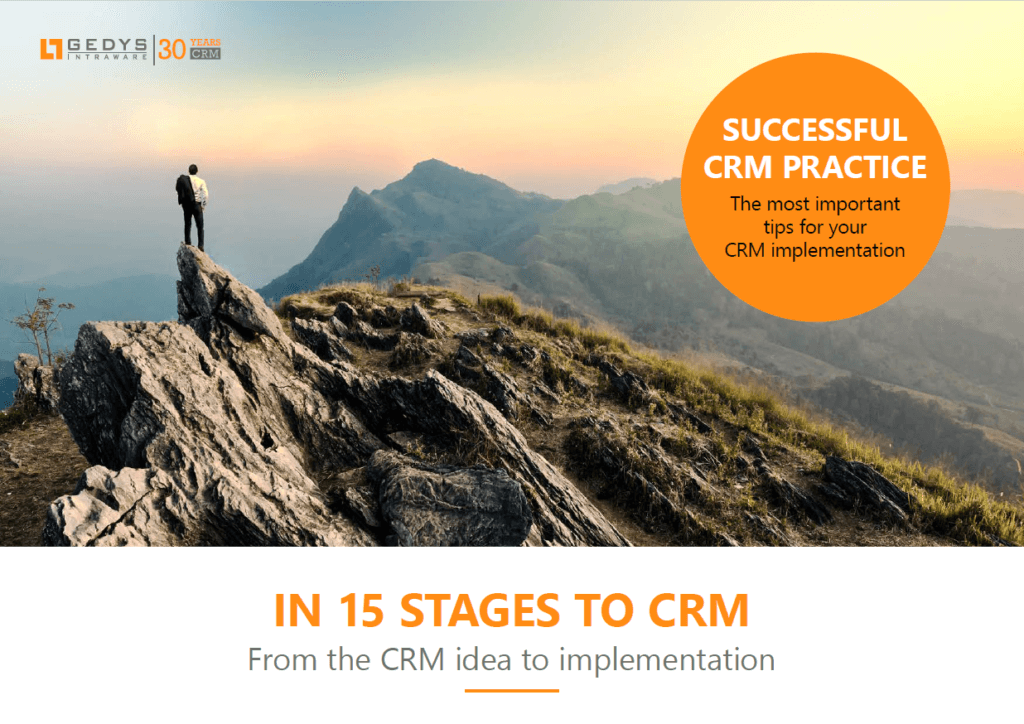Clear CRM processes as the basis for successful customer management
The CRM processes support or control the orientation of the company towards the customer.
Table of Contents
CRM processes differ in
- Strategic CRM processes: e.g. New customer acquisition
- Operational CRM processes: core of the company’s business processes
- Analytical CRM processes: supports strategic and operational processes
The goals and measures of the CRM strategy form the basis for the operational CRM. As a result, the operational CRM processes are broken-down sub-processes to fulfill the strategic process. They are “cast” into the CRM software.
Using the example of new customer acquisition: The aim of the operational level is to establish customer contacts, attract new customers and maintain customer information. The corresponding tasks are “cast” into the operational customer processes.
The evaluation and processing of the data is carried out via analytical processes.
From CRM strategy to CRM processes
The CRM strategy was used to determine which goals, with which customer groups, by which measures, and over and over and over time. After that, a strategic objective for the resulting CRM processes is developed.
The CRM processes take the strategy as the basis for optimally shaping interactions and communication at all customer contact points (call center, field service, website, etc.) throughout the entire customer journey. This means that all CRM processes, from customer acquisition to complaint and customer loyalty, should become simpler and faster and deliver better quality.
Guide to successful operational CRM processes
The operational processes as the core of the business processes are characterized by direct customer contact or by support of customer contact.
In order to optimally design the customer processes, they must first be compared in a target-actual
- identified and analyzed
- Optimized
- Documented
to become. This work usually falls within the remit of the CRM manager, who describes all processes with his CRM team, which consists of key users from the different departments.
Examples:
- GDPR compliant mailings and campaigns with CRM in marketing
- Lead management between marketing and sales
- Customer visit and quotation tracking with CRM in sales
- Compliance with Robinson Lists
- Support hotline and complaints with CRM for Service & IT
The resulting documentation serves as an internal guide for customer management in the first step. After all, it is only when all employees know who has to do what and when that processes are targeted.
CRM processes need digitization
At each step of the process, employees need information about the customer to perform their tasks.
If the flow of information is continuous and digitized, CRM processes can be simplified and accelerated.
The required quality can only be met if the employees have to focus on relationships and results in customer contact instead of on technical and administrative details. For this, they need relief from the routine activities.
The analysis of all information about the customer, from communication to offer and purchase to service and complaint, serves the management to control and improve customer processes. But also the retrospective analysis of the efficiency of CRM processes.
The digitization of processes is almost inevitable.
Transparency and structure for work and process processes
With the use of a CRM system, all data is collected, provided and analyzed.
All customer concerns, whether offers, complaints or enquiries go through defined process steps. This guarantees that every concern is treated equally and that requirements such as e.g. EU GDPR in customer management and mail blocking, the four-eyes principle etc. are ensured.
Hardly any employee can remember all the company’s requirements. If the employees rely on work instructions, the CRM software then guides them through complex processes. This protects against errors, guarantees high data quality and ensures that e.g. comply with all legal requirements.
Therefore, one task in operational CRM is the extensive automation of customer activities, processes and campaigns. Some examples of the automation of customer activities can be found here in the video about the CRM software function overview.
On Top: Support Analysis
Only the digitization of customer data allow analyses and reports.
Analytical CRM processes support strategic and operational processes by generating knowledge about customer structures and customer behavior. This will support concrete measures within the operational processes for implementing the CRM strategy.
CRM processes merge CRM strategy and technology*
*according to Österle
A corresponding supporting CRM system is required for the implementation of analytical and operational processes. This customer database is the central database in which all information from the business transactions is collected. All employees have access to this central data in order to full fill their tasks in the best possible way.
Click here for more information on “What is a CRM system?“
Back office systems, such as an ERP or SCM system, take on tasks in the handling of business processes outside of pure CRM processes and are connected to the CRM system. You can also read the article CRM and ERP: Why connect the two systems?.
Cross-system evaluation functions and tools enable an analysis of the stored data and provide reports and forecasts for economic decisions in the company.

